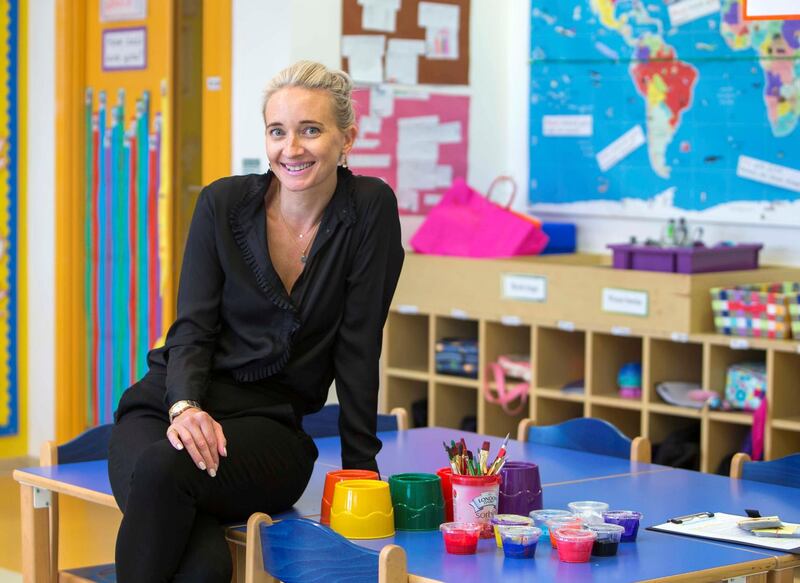A new education report has laid bare a lack of progress in the teaching of Arabic in private schools in Dubai.
In the Indian school curriculum just 21 per cent of schools were rated as ‘good’ or ‘better’, for Arabic as an additional language, by education regulator the Knowledge and Human Development Authority. That rose to 42 and 52 per cent for UK and US curriculums respectively. Among the better results was 73 per cent for Ministry of Education curriculum schools, where many pupils tend to be native Arabic speakers.
Released this week, the tenth annual report titled A Decade of Growth, differentiated between Arabic taught as an additional language and Arabic as a first language; and while both subjects showed improvement over 10 years, the rate was much slower than that of other subjects.
The stark difference became apparent when comparing the rate of improvement in subjects such as mathematics in which 71 per cent of Indian schools received ‘good’ and ‘better’ ratings this year, compared to 43 per cent ten years prior. Some 73 per cent of Indian schools achieved 'good' or 'better' ratings in English and science, up from 42 per cent in 2008 - when the assessment was first carried out by KHDA.
Rashmi Nandkeolyar, principal and director of Delhi Private School in Dubai, said the disparity was down to a lack of motivation from pupils to study the subject.
The school teaches Arabic as an additional language and received a rating of ‘weak’ in middle and secondary school for attainment of goals and an ‘acceptable’ rating for progress. For English, the school earned an ‘outstanding’ through primary, middle and secondary school.
_______________
Read more:
UAE schools urged to teach more Arabic earlier as pupils fall behind
Dubai private schools up their game after ten years of inspections
Word in UAE school libraries is ‘Arabic is cool’
_______________
“Pupils are not using Arabic and thus they don’t see the value of it in their lives. Arabic is not the lingua franca in Dubai and they (pupils) can manage without it,” said Ms Nandkeolyar.
“This has to change because if they want to live here in this region, knowing Arabic is an advantage.”
Pupils are also less inclined to study Arabic because the language is not tested in board exams.
“They do well in French since it’s a board paper and we are motivated by board results,” she said.
In an effort to combat this, the school has introduced Arabic classes to children in kindergarten, though they are not required to do so until Grade 1. Their target is to familiarise children with 100 Arabic words in KG1 and KG2.
Delhi Private School is also now employing the use of cartoons, films, radio shows, events and competitions where pupils are obliged to speak in Arabic. An integrated learning approach is also adopted by inter-connecting Arabic with different subjects.
“These practices have helped the school improve but not at the pace accepted as the bar keeps being moved up,” said Ms Nandkeolyar.
Naomi Williams, headmistress at Foremarke School in Dubai, said the school is making progress, albeit slowly, in Arabic. The school ranked ‘acceptable’ for attainment of goals and ‘good’ for progress.
“Children who don’t speak Arabic as a first language do not use Arabic at all in Dubai. In addition, Arabic is one of the most difficult languages to learn. These factors are coupled with the transitory nature of life in the country,” said Ms Williams.
“We need to raise levels in Arabic and we are focusing on leadership and teaching. Our performance has improved marginally over the years.
“At the teaching level, we drill down a lot closer on the progress,” she said.
The school has employed Arabic teaching assistants to be able to pay closer attention to each pupil’s needs. Foremarke School also has an individual action plan for Arabic underachievers to identify gaps.
“We have a robust tracking and assessment procedure for both Arabic as a first language and for Arabic as an additional language,” she said.
Fatma Belrehif, executive director of Dubai School Inspection Bureau, said: “Individual inspection reports provide each school with detailed recommendations on areas for improvement annually. The inspection process focuses on scrutinising school’s improvement plans and the quality of leadership in driving improvement.”
KHDA also encourages schools to share best practices with each other. Initiatives that facilitate this include ‘What Works’ and ‘Living Arabic’.







